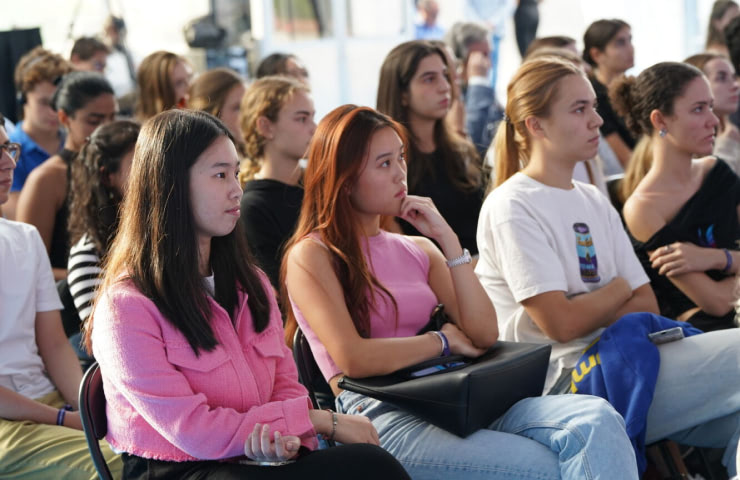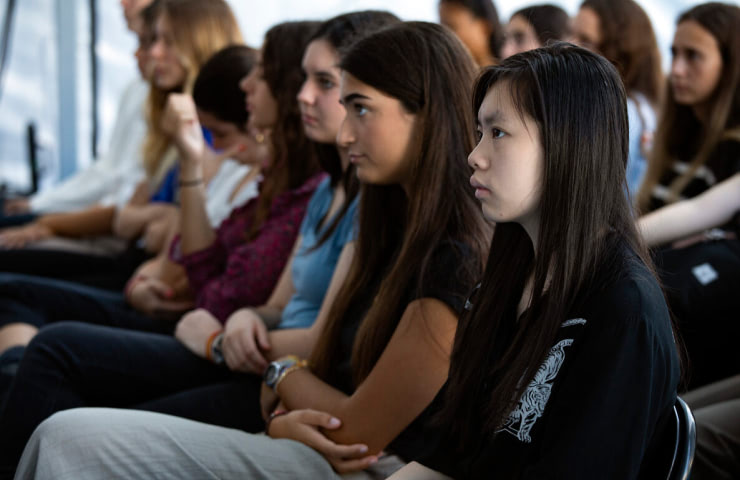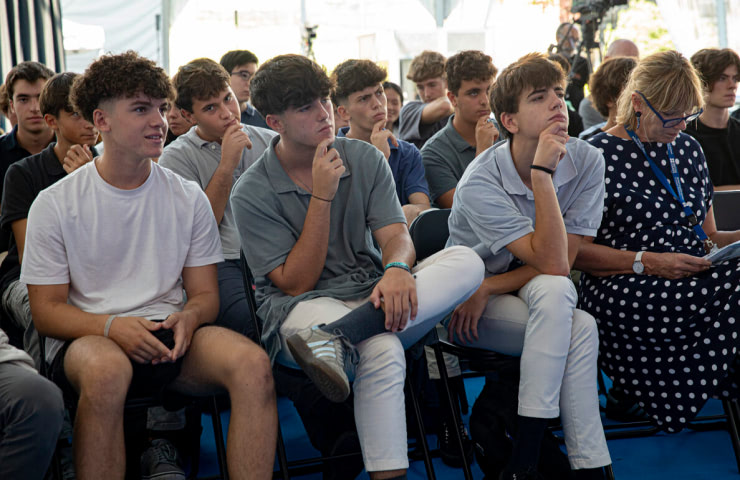The 18th edition of Hay Festival Segovia recently came to a close after a thought-provoking odyssey of stories and ideas. Co-hosted by IE University, the annual gala brought together acclaimed local and international writers, scholars, and thought leaders in Spain’s biggest literary event.
Hay Festival Segovia 2023 ran from September 15th-17th, with several smaller forums taking place in the days leading up to the main event. Expert panelists explored the power of the written word in the modern age against the stunning backdrop of our Segovia campus. Through a series of talks on journalism, writing, and literature, speakers explored the importance and impact that the humanities have in society.
Documenting history in the making
Renowned author, royal analyst, and documentary filmmaker Robert Hardman covered the British Royal Family for more than 30 years. In the talk Elizabeth II, The ‘Ordinary’ Queen, Robert and Hugh Elliot—diplomat and the UK’s ambassador to Spain—discussed the extraordinary life of Britain’s longest-serving monarch.
Robert has already written several books covering different aspects of royal life, including the film and book Monarchy: The Royal Family at Work, as well as Her Majesty, Queen of the World and Queen of Our Times. However, he knows there are many stories yet to be told. “What was the Queen really like? There is always new material, always new people to talk to,” he explained.
Indeed, for his latest publication, Robert got to hear new, untold perspectives from various prime ministers and former US president George W. Bush.

“She was one of the last people on Earth to find out she became Queen because she was traveling in a remote area when her father died. She was 25, had two children, and all of a sudden became queen.” Robert shared many similar tales from behind the scenes of a life lived mostly in the public eye, like the Royal Family’s travails during the Second World War, or the fact that the Queen made over 120 state visits throughout her tenure.
Dissecting genres and formats
Ever since he published his first novel in 1987, Javier Cercas has become one of Spain’s most well-known social commentators. The author, article writer, and essayist is inspired by the world around him, writing stories that resonate with a wide audience. As a result, his work has been translated into over 30 languages and lauded internationally with prestigious awards for fiction, non-fiction, and journalism in Spain, France, Italy, and the UK.
Javier spoke about his illustrious career and latest projects with writer and journalist Vicente Vallés at the event 22 Años Sin Callar. In exploring the growing intellectualism in literature, he provides insight into just why fiction and nonfiction are so disconnected. “Novelists and intellectuals don’t get along well, because novelists work with irony, false truths, subtleties, and gray areas. On the other hand, intellectuals want to see things in black and white.”
The discussion then turned to the symbiotic relationship between writer and reader. According to Javier, “I have very few certainties, but this is one of them: half of every novel is written by the reader.” For every book, the reader acts as a protagonist, leaning on their unique knowledge and experiences to form their own interpretation of the text. “That isn’t to say that every interpretation is a good one,” he adds. “It is only to say that every novel is a mirror.”
Javier also asserted that journalistic writing is literature, noting that some of this century’s best prose can be found in the press. “Journalists tend to have an inferiority complex, but it’s false.”

“There is no superior or inferior genre of writing. There are only superior or inferior ways of writing within that genre.” – Javier Cercas
Curating news from far-off lands
Foreign correspondent and author Sandrine Morel, alongside journalist and author Lane Green, joined writer and journalist David Jiménez for an exciting conversation on Exploring Foreign Experiences: Identity, Style, and Writing. All three have racked up impressive accolades during their long careers and offered unique insights into language and communication in different cultural contexts.
When looking back at their careers, each speaker acknowledged the slow death of clichés in their writing. For David, those he used when starting out as a correspondent in Africa and the Middle East have since been disproven. In Sandrine’s case, “The first couple of articles I wrote in Spain were definitely very cliché, but they were true.” But the only remedy for this is time. As David explains, “When you live in a new country for a certain amount of time, you lose the fresh perspective of a foreigner. But, you stop writing about cliché topics.”
Early on, Lane noticed peculiarities unique to his audiences in Spain: “Spanish people really care about what correspondents write about them.” This is just one example of why it’s important to understand the nuances of local cultures and languages, using them to effectively communicate ideas. It also translates when it comes to coded or politically correct language to talk about certain localized concepts to a broader global audience. As Lane put it, “At The Economist, we believe it’s our duty to be specific and understandable. If an act is brutal, we need to reflect its brutality, rather than making it vague or softened.”
Literature for every age
Argentinian-born Mercedes Ron has become a big name in children and young-adult literature with the success of her novels and trilogies. The young author and audiovisual communicator followed a non-traditional route to literary fame: after writing her first trilogy before turning 20, Mercedes couldn’t find a publisher willing to take a chance on her. So she put her stories up on the popular platform Wattpad, where thousands of young people have since read her work. Mercedes is now an accomplished author with a publishing deal, ten titles under her belt, and a Spanish-language movie adaptation of her book, Culpa mía, released on Prime Video earlier this year.
Mercedes took the stage for the talk La Literatura Juvenil También Suma (The Value of Children’s Literature). She used her own difficult start in reading to illustrate just how important books are to children and adolescents. From experience, she’s found that the most popular theme among this demographic is love. “Love is universal and I try to write my love stories in a neutral way that doesn’t limit it to Spanish culture,” she explains. Mercedes also has a special fondness for clichés, loving to serve them up with an unexpected little twist.
While Mercedes enjoys strong support among her community of readers, she admits the toughest part of being a voice for the new generation of digital natives is the constant negative feedback.
“They think you won’t read them, but you do. But it’s okay. Some of them are constructive: you learn from them and it helps you write better books.”

That’s one reason she encourages new writers not to shy away from feedback. “Believe in yourself,” she stresses. “From passion comes amazing things.”
One for the books
Hay Festival Segovia 2023 offered a glimpse into the vibrant literary scene that’s very much alive in Spain and around the world. It also revealed how technological advances and shifts in reader preferences are influencing language, literature, and culture. Through this event, attendees were reminded that stories are more than just words, but also tools that shape our collective memory of human experience.
Hay Festival Segovia 2023 fosters the humanities through literature
If you’re ready to see the world through a new lens, IE University can show you how.






